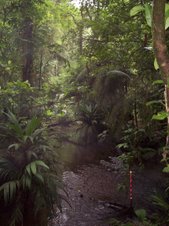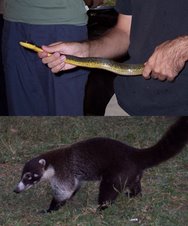Anyway, here's the quote: "The most erroneous stories are those we think we know best - and therefore never scrutinize or question." This was a frequent theme of Gould's (see, e.g., his well-known and oft-cited "Spandrels of San Marcos" paper), and also a frequent topic of interest to me (e.g., discussed in this blog post from earlier this year: Ch. 2, Gotelli and Ellison)
The scientific method is dependent, among other things, upon objectivity, and scientists tend to pride themselves on their ability to approach a system or a question with no pre-conceived notions or biases. But yet, we're all human, and as such we naturally tend to make assumptions, prefer evidence which supports our conclusions, and fail to question that which we "know" to be true, despite our best efforts to the contrary. I'm not saying that all scientists are biased - not by any means! - just that -we have to continually work to question our presumptions.
This is an especially relevant topic at this point in my career, as I'm delving deeper and deeper into one obscure corner of the literature, and at this point in time, as I'm reviewing proposals by other scientists at similar points in their careers. I catch myself viewing general ecological questions through the filter of my particular study system and organism, while failing to consider alternate viewpoints - often just because they never crossed my mind! In reviewing proposals and published papers, I find other scientists doing the same thing - looking only at the influences of one particular set of forces, or one particular group of organisms, while not taking into consideration other forces that could be equally, or of greater, importance. To give an example, imagine that you want to study plant-herbivore interactions. I as a bird person tend to focus on the roles avian predators have on controlling insects while failing to recognize the roles of parasitoids, while a recent frog paper I read built exclusions that did not exclude birds, but then failed to recognize their likely role in altering insect abundances.
So, I'm going to copy that quote (and save it in yet another Notepad file somewhere on my Desktop, Megan!) in an attempt to remind myself to question my assumptions and filters...




1 comment:
Sure thing Nicole. In taking courses across disciplines, it is easy to see that people are biased by their background and theoretical framework. The best work is done when people of different perspectives collaborate or if at least an individual gets some outside comments. It is hard to think of everything!!
Post a Comment